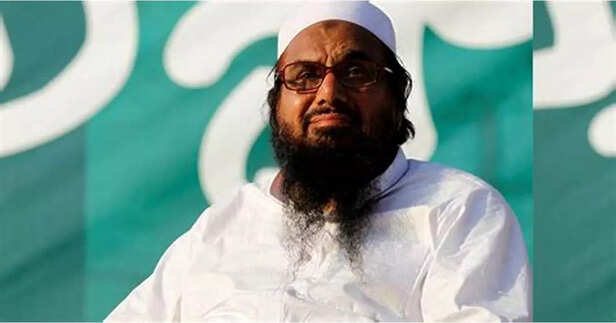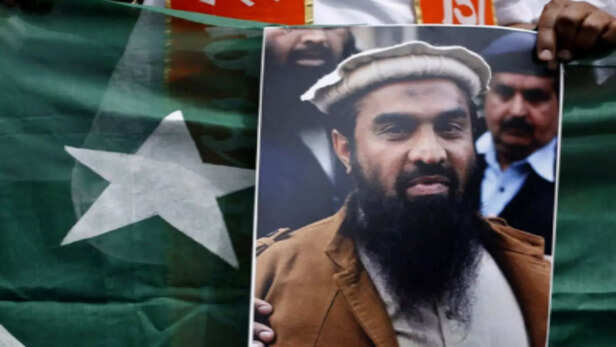Why India Is Demanding Hafiz Saeed, Lakhvi, and Sajid Mir From Pakistan
Nidhi | May 21, 2025, 00:48 IST
( Image credit : Times Life Bureau, Timeslife )
India has officially demanded the extradition of three key 26/11 masterminds—Hafiz Saeed, Zaki-ur-Rehman Lakhvi, and Sajid Mir—from Pakistan. These terrorists were not only responsible for orchestrating the deadly 2008 Mumbai attacks but continue to operate from Pakistani soil under state protection. This article explains who they are, the attacks they led, why India is intensifying pressure on Pakistan now, and how this demand ties into India’s broader anti-terror doctrine and its stand on the Indus Water Treaty.
India has issued a strong diplomatic and strategic warning to Pakistan: hand over terrorists Hafiz Saeed, Zaki-ur-Rehman Lakhvi, and Sajid Mir, or continue to face the consequences of India’s aggressive counter-terrorism stance. The statement was made by JP Singh, India’s ambassador to Israel, during an interview with an Israeli news channel.
JP Singh, a seasoned diplomat who has served in the Indian High Commission in Pakistan, said that India’s military operation against terrorism present in Pakistan is not over. He declared that “the new normal” is a firm, no-compromise approach to terrorism, which includes cross-border actions if required.
But why exactly does India want these three men? The answer lies in a history soaked in blood — and evidence.
Because he architected the terror ecosystem responsible for India's worst civilian attack. India has provided dossiers with evidence to Pakistan and international bodies, yet no meaningful trial has occurred.
Because he was the field commander of the Mumbai massacre, and remains active within Pakistan’s terror network.
Because Sajid Mir was the tactical controller of the attack and has evaded justice under Pakistan’s protection for over 14 years. India has submitted multiple dossiers filled with audio clips, call logs, training camp locations, and financial trail evidence — yet Pakistan has failed to convict or extradite any of these individuals for their crimes against India.
Despite being designated terrorists by the United Nations, Interpol, and the US State Department, they continue to live and operate in Pakistan. In some cases, they receive state protection.
This repeated failure has led India to change its doctrine. As JP Singh put it:
“Now, the new normal is an aggressive anti-terrorism strategy.”
In addition to terror-related issues, JP Singh raised the matter of the Indus Water Treaty — a water-sharing agreement between India and Pakistan signed in 1960 under World Bank supervision.
He said the treaty was founded on good faith and peaceful cooperation, but:
“We were letting water flow, and they were exporting terrorism.”
“This cannot go on... Blood and water cannot flow together.”
India has increasingly used the strategic pressure of water rights as a diplomatic tool, hinting that terror and treaty obligations cannot co-exist. The government has previously suspended talks on the treaty following attacks like Pulwama (2019) and Uri (2016).
The demand to hand over Hafiz Saeed, Zaki-ur-Rehman Lakhvi, and Sajid Mir is not symbolic. It’s about justice, deterrence, and closure. These men were behind the single worst terrorist assault in India’s history, and their continued protection by Pakistan is viewed as an act of state complicity.
India has made it clear: until action is taken, normalcy cannot resume.
No dialogue, no water cooperation, no peace process — unless Pakistan proves that terrorism will no longer be tolerated on its soil.
JP Singh, a seasoned diplomat who has served in the Indian High Commission in Pakistan, said that India’s military operation against terrorism present in Pakistan is not over. He declared that “the new normal” is a firm, no-compromise approach to terrorism, which includes cross-border actions if required.
But why exactly does India want these three men? The answer lies in a history soaked in blood — and evidence.
Who Are These Terrorists — And What Did They Do?

Hafiz Saeed
( Image credit : Times Life Bureau )
1. Hafiz Saeed — The Ideological Leader of Lashkar-e-Taiba
- Role: Founder of Lashkar-e-Taiba (LeT), a UN-designated terrorist organization.
- Key Crime: Mastermind of the 26/11 Mumbai attacks (2008), which killed 166 civilians and injured over 300.
- Links to attack on Indian Parliament (2001).
- Radicalising youth in Pakistan and Kashmir through his so-called charity Jamaat-ud-Dawa (JuD).
- Links to attack on Indian Parliament (2001).
- Radicalising youth in Pakistan and Kashmir through his so-called charity Jamaat-ud-Dawa (JuD).
- Status in Pakistan: Though placed under house arrest multiple times, he continues to speak at public rallies and operate freely under different aliases.
Because he architected the terror ecosystem responsible for India's worst civilian attack. India has provided dossiers with evidence to Pakistan and international bodies, yet no meaningful trial has occurred.
2. Zaki-ur-Rehman Lakhvi — The Military Commander of Terror

Zaki-ur-Rehman Lakhvi
( Image credit : Times Life Bureau )
- Role: Operational chief of LeT, directly oversaw the training and logistics for 26/11.
- Key Crime: Controlled real-time operations of the Mumbai attackers from a safehouse in Pakistan; his voice was recorded giving orders to the terrorists.
- Oversaw infiltration of LeT militants into Jammu & Kashmir.
- Coordinated terror training camps for jihadists.
- Oversaw infiltration of LeT militants into Jammu & Kashmir.
- Coordinated terror training camps for jihadists.
- Status in Pakistan: Arrested after 26/11 but released on bail in 2015. He reportedly lives freely with armed guards.
Because he was the field commander of the Mumbai massacre, and remains active within Pakistan’s terror network.
3. Sajid Mir — The Ghost Handler Who Was Finally Found

Sajid Mir
( Image credit : Times Life Bureau )
- Role: Senior LeT commander and international recruiter.
- Key Crime: Chief handler of the 10 Pakistani terrorists involved in the 26/11 attacks.
- Plotted attacks in Denmark, France, and the US.
- Recruited David Headley (an American terrorist) who scouted targets in Mumbai.
- Plotted attacks in Denmark, France, and the US.
- Recruited David Headley (an American terrorist) who scouted targets in Mumbai.
- Denied existence by Pakistan for over a decade.
- Finally arrested quietly in 2022, just before a major FATF review, and sentenced for terrorism financing—not for 26/11.
- Denied existence by Pakistan for over a decade.
- Finally arrested quietly in 2022, just before a major FATF review, and sentenced for terrorism financing—not for 26/11.
Because Sajid Mir was the tactical controller of the attack and has evaded justice under Pakistan’s protection for over 14 years.
India’s Frustration: No Real Action from Pakistan
Despite being designated terrorists by the United Nations, Interpol, and the US State Department, they continue to live and operate in Pakistan. In some cases, they receive state protection.
This repeated failure has led India to change its doctrine. As JP Singh put it:
“Now, the new normal is an aggressive anti-terrorism strategy.”
Indus Water Treaty: ‘Blood and Water Cannot Flow Together’
He said the treaty was founded on good faith and peaceful cooperation, but:
“We were letting water flow, and they were exporting terrorism.”
“This cannot go on... Blood and water cannot flow together.”
India has increasingly used the strategic pressure of water rights as a diplomatic tool, hinting that terror and treaty obligations cannot co-exist. The government has previously suspended talks on the treaty following attacks like Pulwama (2019) and Uri (2016).
Terror Has a Cost, and India Won’t Wait Forever
India has made it clear: until action is taken, normalcy cannot resume.
No dialogue, no water cooperation, no peace process — unless Pakistan proves that terrorism will no longer be tolerated on its soil.
